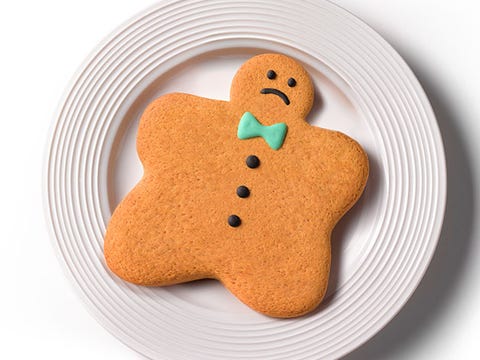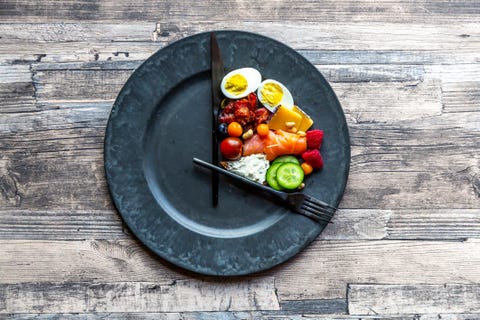How to Get Rid of Belly Fat in 2 Weeks
If you want to know how to lose belly fat you've come to the right place, but despite your desire you can't spot-reduce (target) individual areas of fat, and that includes your belly. No amount of crunches, sit-ups or toes-to-bar will eradicate your spare tyre. Instead, it's lifestyle habits and dietary choices that are going to help you eradicate your unwanted midriff.
Handily, there are plenty of actionable routes you can take to start eviscerating this build-up of visceral fat. And it's a good idea to do that because as it surrounds your liver, stomach and intestines belly fat can increase your risk of cardiovascular disease and cancer. So sure, bigger arms and a wider chest are more appealing — but if long-term, holistic health is your goal, then you need to reassess your training priorities. The war on your belly fat will be a balanced one — comprised of exercise, diet choices, sleep improvements and, crucially, a better understanding of the roles calories play.
Right, time to get started.

Subscribe to Men's Health UK
hearstmagazines.co.uk
The Different Types of Belly Fat
Not all fat is created equal. Excess timber around the waist hurts your health in a way that subcutaneous fat – the soft layer of chub that sits directly under the skin – doesn't. Belly fat (a.k.a. visceral fat) is stored in your abdominal cavity, and shares space with important organs like the liver, stomach, kidneys and intestines.
Belly fat is metabolically active, which means it's basically an organ in itself – but not one you'd want to donate.
It excels at pumping out various inflammatory substances, interfering with hormones that regulate appetite, weight, mood and brain function and sending your cortisol levels — responsible for stress — through the roof. No surprise then, that it's associated with an increased risk of type 2 diabetes, heart disease and certain types of cancer.
So far, so tragic. There is, however, some good news. Belly fat may be the most dangerous type of body fat, but since it's buried deep within your body, it's also the easiest to get rid of. But before we talk about that, it's worth identifying the causes of belly fat. After all, it's far better to not put the weight on in the first place.
This content is imported from YouTube. You may be able to find the same content in another format, or you may be able to find more information, at their web site.
4 Scientific Reasons for Belly Fat
We all know that eating too much and moving too little is the foundation upon which flab is built. But there's more to the belly fat equation than 'calories in and calories out'. Certain stressors, for example, will see you scaling your belt notches with very little effort. Here's what you should look out for.

1. You're Eating Trans Fats
If antioxidants are the good guys of gut health, trans fats are the super-villains. These sneaky fats actively contribute to your growing waist line – not just by adding new fat, but by moving fat from other areas of your body to your belly. During a six-year study at Wake Forest University, monkeys that were fed an 8 per cent trans-fat diet had 33 per cent more belly fat than monkeys that were fed an 8 per cent monounsaturated fat diet.
There are currently no legal requirements for food manufacturers to label trans fats, according to the British Dietetic Association, so you need to check ingredients lists for hydrogenated fats and hydrogenated vegetable oils. The biggest culprits? Your 'cheat day' favourites: cakes, biscuits, ice cream, popcorn, pies, fried food, fast food and takeaways.

Luis Alvarez Getty Images
2. You're Seriously Stressed
When your cortisol levels are through the roof, it triggers the release of insulin, and this is where things go awry. Initially, the 'fight-or-flight' response shuts down your digestive system so you can deal with the "threat", like a very hungry lion or, more realistically, a presentation at work. Once the danger has passed, your body seeks to replenish the hundreds of calories you burned fighting to the death/sweating at the thought of speaking in front of your colleagues and makes you ravenously hungry.
Since your blood sugar levels are now super low (thanks insulin) and your reward centres are blinkered (thanks cortisol) you wind up face-planting the biscuit tin rather than the fruit bowl. To make matters worse, cortisol helps to release myostatin, a protein that breaks down muscle.
3. You're Drinking Too Much Alcohol
Can one too many pints really earn you a beer belly? Well, yes. As you gulp down your drink, your body turns the alcohol into acetate, which your body can't store. It becomes your primary energy source, and the proteins, carbs and fats swirling around your digestive system are converted to fat by default.
Factor in the excess calories from your drinks (around seven per gram) – with the gut-busting kebab you pick up on the way home ('drunk hunger' is a real, proven thing) and suddenly you're looking at excess fat storage.
Not only does a night on the sauce send your cortisol levels through the roof, it saps your testosterone, which means you'll find it more difficult to build lean muscle and burn fat as fuel.

4. You've Got Too Much of the Wrong Gut Bacteria
Most of the bacteria that dwell in your gut are pretty useful. They produce hormones, regulate your immune system, digest food, extract nutrients, control your mood, manage your appetite and much more besides.
Now, two groups of beneficial bacteria are dominant in the human gut, the bacteroidetes and the firmicutes. However, the number of bacteroidetes is decreased in obese people when compared with lean people, according to research.
In another study, scientists took stool samples from 1300 twins and found that the less diverse your gut bacteria, the more likely you are to have belly fat. Grow your gut community to shed serious timber.
20 Scientifically-backed Ways to Lose Belly Fat
If you're serious about banishing your 'belly fat' and improving your health, surviving on salad and hitting the treadmill for hours on end is a miserable (and highly inefficient) way to go about it.
Here's twenty scientifically-backed ways to shift belly fat.

skynesher Getty Images
1. Hike up Your Metabolism
Your ultimate goal is to hike up your metabolism, but it's important to know that your diet, how much muscle you have, how well you manage stress, and your quality of sleep all play a part in this.
"A faster metabolism helps burn fat," explains Marcus Reddy, consultant laparoscopic, upper GI and bariatric surgeon at Spire St Anthony's Hospital. While your metabolism is predetermined by your body size, sex and age, he says, "increasing lean body mass, avoiding long periods of hunger, and intense periods of physical activity can aid burning".
This content is imported from YouTube. You may be able to find the same content in another format, or you may be able to find more information, at their web site.
2. Eat More Protein
Prioritise lean protein like beef, turkey, eggs, fish, chicken, and tofu. University of Missouri researchers compared the benefits of consuming a normal-protein breakfast to a high-protein breakfast and found the high-protein breakfast, which contained 35 grams of protein, prevented weight gain, reduced daily food intake and feelings of hunger and stabilised glucose levels among overweight teens who would normally skip breakfast.
Don't know your steak from your salmon when it comes to deciphering protein, fats, and carbs? You need our ultimate guide to tracking your macros.
This content is imported from {embed-name}. You may be able to find the same content in another format, or you may be able to find more information, at their web site.
3. Eat Fewer Refined Carbohydrates
Limit foods high in refined carbohydrates and refined sugar (white bread, white pasta, white rice), and replace them with high fibre 'complex carbs' – think: whole grains, brown rice, sweet potato, oats, beans and pulses. Fill your boots with as many vegetables as possible – they're low calorie, high in micronutrients, and the fibre in them will keep you full.
Snack on portion-controlled fruit, seeds and nuts. One study found that snacking on 42g of almonds per day (instead of munching on something high-carb with equal calories) helped to reduce belly fat and improved cholesterol levels. "The high levels of fibre are proven to combat excess calorie consumption later in the day," says registered dietitian Lucy Jones.
4. Go Mediterranean
A 2019 review of evidence on the Mediterranean diet concluded that it "is associated with numerous health benefits and has been demonstrated to exert a preventive effect towards numerous pathologies, including obesity". Better yet, the diet boosts the number of healthy bacteria in your gut – a study published in the journal Frontiers in Nutrition saw levels rise by up to seven per cent, compared with a western diet.
5. Eat Regularly
It's also important to make sure you're eating regularly. Avoid very low-calorie diets or 'crash diets', advises Reddy. "Periods of starvation can lower your metabolism and prevent you losing weight."
Our beginner's guide to meal prep won't leave you hungry.

ElNariz Getty Images
6. Up the Intensity of Your Workout
Focus on increasing physical activity and building muscle to burn belly fat, recommends Reddy. "Mild activity such as walking is poor at burning fat due to its low energy consumption whilst intense cardio training will consume energy and increase metabolic rate after exercise," he says.
When scientists from Canada's Laval University compared a 15-week HIIT programme and a 20-week endurance-training programme, they found the former was far more effective at stoking up the body's metabolism, which resulted in greater fat loss.
7. Lift Weights too
Of course upping the intensity of your workouts will have a great affect on your body fat percentage, but balance your high-intensity workouts with weight lifting sessions and you're onto a winner. Researchers at Harvard University followed more than 10,500 men over a 12 year period, and found that those who added 20 minutes of weight training to their regular cardio workout gained less age-related belly fat than those who pounded the treadmill.
Focus on compound moves like deadlifts, squats, kettlebell swings, lunges, chest presses, shoulder presses — compound exercises that work your entire body rather than isolating muscles. Like we've already said, you can't 'spot-reduce' fat so endless crunches will do little for getting rid of your belly. For best results split your sessions over different days.
Not sure where to start? Our beginner's guide to lifting weights will have you pumping iron like a pro before you know it.

RapidEye Getty Images
7. Learn How to Manage Stress
You don't have to take a three-month sabbatical in Bali or enrol on a 'breathing class' in a Scandi Yogi retreat to find inner calm. You don't even have to meditate (though it'll almost certainly help). If a few minutes of deep-belly breathing in a quiet spot doesn't chill you out, try a bodyweight workout or taking a walk around the block. Exercise boosts your circulation, transporting cortisol to your kidneys, which flush it out.
8. Slow Down Your Eating
Eating slowly will also help cinch your waist, too. Inhaling croissants while run-walking to work will do little to satiate you – not that you'll do much digesting anyway, with all that cortisol flooding your system. Instead, by making time to eat and focusing on your food (that also means not scrolling through Instagram), you'll wind up eating less and you'll feel fuller for longer.

MAURO FERMARIELLO/SCIENCE PHOTO LIBRARY Getty Images
9. Get Quality Sleep
Multiple studies have shown an association between short sleep and weight gain. When you're low on Zzz's, activity in the brain's frontal lobe (the sensible decision-making part) is impaired. At the same time, the more 'primal' parts of your brain that deal with things like desire and motivation are lit up like the Blackpool Illuminations.
Inadequate sleep also wreaks havoc on your metabolism. When the body doesn't get enough rest, it conserves energy by slowing down basic functions. The combination of untameable cravings, little willpower and inefficient processing is an open invitation for fat storage. Follow our advice to improve your sleep tonight.
10. Eat Naturally
This doesn't mean you need to eat the entirety of the fruit and veg aisle, but instead to eat foods that are higher in fibre. Think fruits, vegetables, legumes and whole grains — these can reduce your risk of inflammation and offset future metabolic issues. In a study published in Obesity , a 10g increase in fibre intake was linked to a 3.7 decrease in the risk of gaining visceral 'belly fat'..
11. Manage Your Cravings
Can't stop snacking? It's these habits that could be leading you to gain weight without you knowing it. A high-protein diet, for example, can help nix these hunger pangs — as the macronutrient decreases activity in the area of the brain that's responsible for cravings.
12. Avoid Trans Fats
If you've been paying attention then you'll know it's best to avoid trans fats, but as well as a way of getting rid of your gut, avoiding trans fats also lowered the risk of inflammation, heart disease, insulin resistance and abdominal fat gain in both observational and animal studies.
13. Curb Your Drinking
They don't call it a beer belly for no reason, so if you want to lose some size around your gut you can do worse than watching how much you drink. A study published in the European Journal of Nutrition found that "alcohol consumption in elevated amounts was associated with risk of abdominal obesity in men".
14. Stop Drinking Sugary Drinks
If there's a hierarchy of sugary goods, then sugary drugs would sit even higher than sugary foods. However, even a small change to your habits here can make a big difference. That was proved in a study by researchers at Virginia Tech, which looked at the benefits of replacing just one sugary drink with water.
"We found that among US adults who consume one serving of sugar-sweetened beverages per day, replacing that drink with water lowered the percent of calories coming from drinks from 17 to 11%," said study author Kiyah J. Duffey. "Even those who consumed more sugary drinks per day could still benefit from water replacement, dropping the amount of calories coming from beverages to less than 25% of their daily caloric intake."

lacaosa Getty Images
15. Try Intermittent Fasting
We're not here to suggest that any fad diet will deliver the slim waist you crave, and ultimately the best diet is one you can stick to, but if you're looking for a way to structure your eating then intermittent fasting may be the answer.
A study by researchers at the University of Illinois at Chicago found that dieters who only ate between 10am and 6pm consumed around 350 fewer calories a day and lost about 3% of their body weight over a 12-week period.
16. Don't Let Diets Take Over
If you find every spare second is given over to thinking about calories, plans and cutting, then maybe the best thing you can do is to take a break from dieting. Research by the University of Tasmania revealed that people who broke from their diet every two weeks and aimed to just keep their weight stable during that period lost more weight and gained less back when their diets had finished.
17. Set Targets
If you're looking to lose belly fat, it's important to know where you've come from and where you want to get to, so there's nothing wrong with setting yourself a target, even if it's ambitious. In fact, a study published in the Journal of Human Nutrition and Dietetics found setting targets increased the likelihood of achieving "clinically significant weight loss" and, for some, setting 'unrealistic' targets improved their results.
18. Lose Weight with Friends
If you struggle to lose weight on your own, consider making it a team effort. According to a study published in the journal Obesity during a 12-week, team-based weight loss competition, getting encouragement from teammate increased the odds of achieving clinically significant weight loss by 20%.
"In our study, weight loss clearly clustered within teams, which suggests that teammates influenced each other, perhaps by providing accountability, setting expectations of weight loss and providing encouragement and support."
19. Celebrate Little Wins
Although you're ultimate goal may be to go from loose to lean, you don't have to wait until you've achieved that to start celebrating. A study by the University of Alabama at Birmingham found that people who break their goals down and celebrate smaller achievements were more successful at gradually losing weight and were able to keep it off in the long run.
20. Combine All of the Above
No one method is going to get rid of your belly for you, so if you want to see results you're going to have to take heed of the above advice and make changes to your diet, training and lifestyle as a whole.
Sign up to the Men's Health newsletter and kickstart your home body plan. Make positive steps to become healthier and mentally strong with all the best fitness, muscle-building and nutrition advice delivered to your inbox.
SIGN UP
Love what you're reading? Join our goal-smashing membership today from only £5, cancel anytime. You belong in the Men's Health SQUAD!
FIND OUT MORE
This content is created and maintained by a third party, and imported onto this page to help users provide their email addresses. You may be able to find more information about this and similar content at piano.io
How to Get Rid of Belly Fat in 2 Weeks
Source: https://www.menshealth.com/uk/weight-loss/a759282/how-to-get-rid-of-belly-fat/